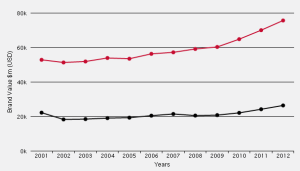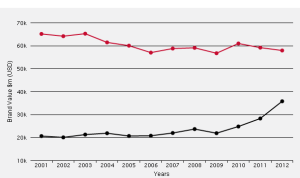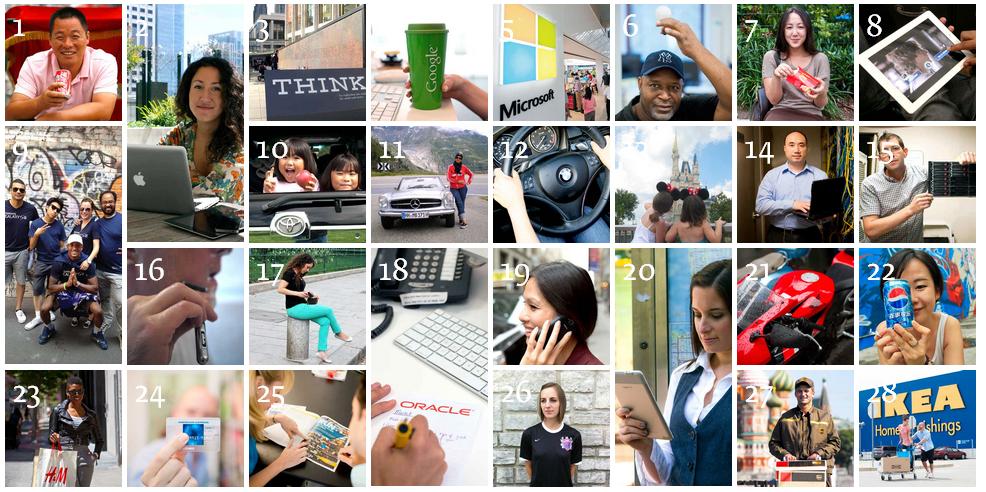As shared at World Business Forum 2012 we share with you the top 10 best global brand and top raisers report by interbrand for 2012 and also you can find the full top 100 list at interbrand website.

Coca-Cola. A name that is more universally recognized than any other in the world. That’s the power of Coca-Cola’s brand. Some will say it’s the flavor, but for millions, it’s the way Coca-Cola makes them feel. A brand that’s always evolving, Coke’s brand promise of fun, freedom, and refreshment resonates nearly everywhere. The company excels at keeping the brand fresh while maintaining a powerful sense of nostalgia that unites generations of Coke lovers and reinforces consumers’ deep connections to the brand. Its edgy campaigns continue to push boundaries, and Coca-Cola reinforced its values through celebratory promotions relating to its 125th-year anniversary (“Sharing Happiness”) and the London Olympics (“Move to the beat”).

- Advertisement -
Few companies have captured our imagination, inspired such devotion, and revolutionized the way we live quite like Apple. While we may assume it’s the products that define Apple, it’s really a certain kind of thinking, a certain set of values, and an unmistakable human touch that pervades everything Apple does — which is why our connections to the brand transcend commerce.
The response to Steve Jobs’ death last year proved how deeply millions connect with Apple on an emotional level. In a world where consumers are oftentimes overwhelmed with information, the role a brand plays in people’s lives has become all the more important to ensuring a business’ overarching success. Nobody understood this better than Steve Jobs. He simplified the complex, democratized technology that was once out of reach, and built a brand so powerful that it forever changed the way consumers think of brands.


IBM, the US-based multinational technology company, has consistently ranked as one of the world’s most innovative, profitable, and sustainable brands — and it is still operating at full speed. IBM continues to reinvent itself to meet everchanging marketplace needs, turning its attention to emerging markets, big data analytics, and cloud computing. Smarter Planet, IBM’s groundbreaking business strategy, continues to drive new product and service development, employee engagement, and corporate citizenship. It remains a textbook example of how to create, build, and deliver a world-leading business-to-business brand. This year, among other innovations, IBM researchers developed low-cost photovoltaic cells made from natural materials that have set the world record for PV solar-to-electric power conversion efficiency. Despite effective brand performance in the past year, revenue in the second quarter of 2012 was weak, especially in business services. Consequently, investor concerns arose when profits goals were met via cost-cutting. However, it is expected that the brand will more than deliver in the third and fourth quarters, much as it did in the first quarter of 2012. Though perceived as leading edge compared to its competitors, to stay ahead, IBM must make sure it continues to deliver big, thought-provoking innovations and maintains its rich legacy of world-changing technological advancement.


While opinions are mixed on Google+ and Google’s other various innovations, overall, the search giant has had a productive year. With minimal room for growth in search engine market share, Google continues to transform itself into a broader IT company. New products and services include the Project Glass augmented-reality head-mounted display, Google TV, as well as Google Drive, a cloud computing service, not to be confused with its efforts to build a self-driving car. The company, known for making bold bets, acquired Motorola Mobility, along with a slew of its patents, which could help Android fight off companies with competing mobile operating systems. Still, Google faces stiff competition from the likes of Apple and Microsoft. Google+ has failed to muscle in on Facebook, and Google Buzz was closed. The company also needs to build trust among consumers following online privacy concerns, Oracle’s allegations of copyright infringement, and the EU’s antitrust lawsuits. Despite these challenges, Google’s revenue has soared this year. The promising Motorola Mobility acquisition and the strength of new and improved products have fueled an impressive 26% increase in brand value, on top of a similar increase last year.


Still one of the world’s most recognized technology brands, Microsoft has found itself in a bit of a holding pattern in 2012, reporting soft growth compared to Google and Apple. In particular, there has been weak computer demand as consumers switch to tablets and try out Windows 8, the newest version of the company’s flagship operating system (OS). Attempting to combat Apple’s lead in the tablet market, Microsoft has promised a revolutionary OS that represents the convergence of technologies along with a consistent, bold cross-platform look and feel. The technology world has had unprecedented access to the development of Windows 8. Its success would catapult Microsoft forward and revitalize the entire PC ecosystem. In an effort to establish more of a human relationship with its current consumers and attract new ones in the process, Microsoft has been making inroads into the healthcare market, serving 22 million users on Live@edu, and pushing Xbox (the number one selling game console in the US). The software giant is also focusing on business users, an area where its competitors tend to be weak. Additionally, Microsoft worked hard to insulate itself against the economic slowdown while building key areas of its business, and, in August, the brand launched a refresh of its corporate identity. Microsoft also pushed into the hardware market with its own Surface tablets and into the competitive fray — the global market for converged software/hardware ecosystems. This move will likely define the brand’s future.








